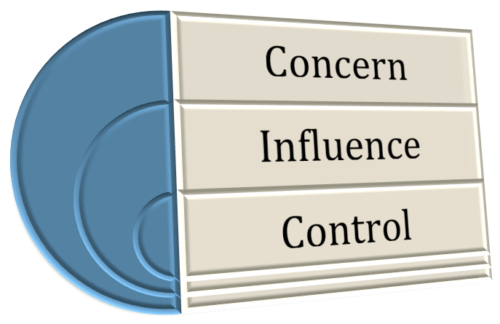Scope creep kills projects. It also kills meetings.
The consensual sphere of Concern, Influence, and Control helps a group become mindful of aspects that could alter the group’s attitudes, beliefs, and decisions. The consensual sphere of Concern, Influence, and Control helps a group to focus, on one issue at a time, or one aspect at a time.
The single most important responsibility of a facilitator is to protect the people or meeting participants. The next most challenging responsibility however is to make it easy for a group to focus on one issue at a time.
The consensual sphere of Concern, Influence, and Control helps separate a discussion into aspects the group controls, aspects they influence, and aspects about which they have no control or significant influence. Since groups seldom perform effectively using a linear approach, consider using a “Bookend” approach for analyzing the sphere of Concern, Influence, and Control. Following are the steps required that can be used to analyze most lists, including prioritizing a list of criteria.
APPLYING THE BOOKEND METHOD TO CONCERN, INFLUENCE, AND CONTROL

Concern, Influence, and Control
Purpose
Effective facilitators shy away from working lists in a linear fashion. The purpose of using a bookend approach is to develop a natural habit of squeezing the grey matter towards the middle, rather than wasting too much time on it.
Rationale
Groups tend to argue about the grey matter that frequently does not affect the decision anyway. For instance, with PowerBalls, you can envision participants arguing whether something is more important than moderate yet less important than high. We know from experience that the most important criteria drive most decisions, so bookends help us identify the critical stuff quickly.
Method
After you have compiled a list of criteria or aspects, compare and contrast them with the simple process explained below:
- Ask “Which of these is the most important?” (as defined by the PowerBalls displayed). With the consensual sphere, our question would be “Which of these is within our control?”
- Next, ask “Which of these is the least important?” With the consensual sphere, our question would be “Which of these is a concern because it is beyond our control?”
- Then return to the next most important . . .
- And to the next least important . . .
- Until the list has been squeezed into the remaining one-third that is moderate…
- If comparing or contrasting Influence, consider asking . . .
- Which is most similar?
- Which is least similar?
- Repeat until one-third remains as moderate.
- For Control consider asking . . .
- What is your greatest strength?
- What is your greatest weakness?
- Repeat until one-third remains as moderate.
______
Don’t ruin your career by hosting bad meetings. Sign up for a workshop or send this to someone who should. MGRUSH workshops focus on meeting design and practice. Each person practices tools, methods, and activities daily during the week. Therefore, while some call this immersion, we call it the road to building high-value facilitation skills.
Our workshops also provide a superb way to earn up to 40 SEUs from the Scrum Alliance, 40 CDUs from IIBA, 40 Continuous Learning Points (CLPs) based on Federal Acquisition Certification Continuous Professional Learning Requirements using Training and Education activities, 40 Professional Development Units (PDUs) from SAVE International, as well as 4.0 CEUs for other professions. (See workshop and Reference Manual descriptions for details.)
Want a free 10-minute break timer? Sign up for our once-monthly newsletter HERE and receive a free timer along with four other of our favorite facilitation tools.
Related Video

Terrence Metz, president of MG RUSH Facilitation Training, was just 22-years-old and working as a Sales Engineer at Honeywell when he recognized a widespread problem—most meetings were ineffective and poorly led, wasting both time and company resources. However, he also observed meetings that worked. What set them apart? A well-prepared leader who structured the session to ensure participants contributed meaningfully and achieved clear outcomes.
Throughout his career, Metz, who earned an MBA from Kellogg (Northwestern University) experienced and also trained in various facilitation techniques. In 2004, he purchased MG RUSH where he shifted his focus toward improving established meeting designs and building a curriculum that would teach others how to lead, facilitate, and structure meetings that drive results. His expertise in training world-class facilitators led to the 2020 publication of Meetings That Get Results: A Guide to Building Better Meetings, a comprehensive resource on effectively building consensus.
Grounded in the principle that “nobody is smarter than everybody,” the book details the why, what, and how of building consensus when making decisions, planning, and solving problems. Along with a Participant’s Guide and supplemental workshops, it supports learning from foundational awareness to professional certification.
Metz’s first book, Change or Die: A Business Process Improvement Manual, tackled the challenges of process optimization. His upcoming book, Catalyst: Facilitating Innovation, focuses on meetings and workshops that don’t simply end when time runs out but conclude with actionable next steps and clear assignments—ensuring progress beyond discussions and ideas.



